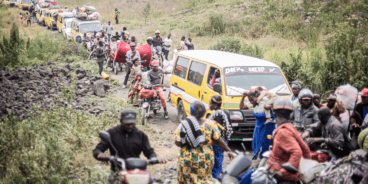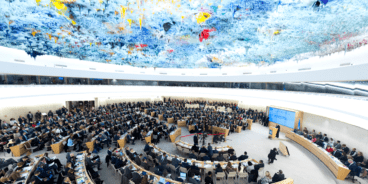Atrocity Alert No. 126: Afghanistan, Cameroon and Democratic Republic of the Congo
Atrocity Alert is a weekly publication by the Global Centre for the Responsibility to Protect highlighting situations where populations are at risk of, or are enduring, mass atrocity crimes.
IEDs and war crimes against civilians in Afghanistan
On Sunday, 7 October, the UN Assistance Mission in Afghanistan (UNAMA) released a special report on the use of Improvised Explosive Devices (IEDs) during the country’s ongoing conflict. According to the report, the use of IEDs by anti-government elements has reached “extreme levels,” with at least 3,634 civilian casualties – including 1,065 deaths – between January and September this year. The casualties include 608 children (155 deaths and 453 injured). In particular, casualties from “suicide IEDs” have increased by more than 46 percent since 2017.
The UN report was released as anti-government armed groups – including the Taliban and supporters of the so-called Islamic State (ISIL-Khorasan) – have been intensifying their attacks on civilian areas. UNAMA stressed that the “widespread use of IED attacks directed against Afghanistan’s civilian population, including religious and ethnic minorities, may amount to war crimes or crimes against humanity.” Although Afghanistan’s armed conflict has already lasted seventeen years, at least 249,000 people have been newly displaced by violence so far this year.
On 8 October the Taliban condemned Afghanistan’s upcoming parliamentary elections, scheduled for later this month, and threatened to disrupt the vote. The elections, which have been postponed for the past three years, have already been plagued by security concerns, including the killing of six candidates and several election workers by armed extremist groups. Hundreds of proposed polling sites have also been shut down.
As Afghanistan approaches the 20 October parliamentary elections it is essential that increased security is provided for all civilians seeking to vote, especially those from minority communities who are often the target of sectarian terrorist attacks. The international community should ensure that UNAMA and the Afghan government are enabled to uphold their responsibility to protect all Afghans, and that the scheduled elections are free, fair and transparent.
Cameroon votes despite violence and ongoing Anglophone conflict
Fear of violence and ongoing political turmoil in Cameroon have prevented thousands of people from voting in the presidential elections held on Sunday, 7 October. In particular, populations in the North-West and South-West regions of Cameroon, where armed Anglophone separatists have been battling the security forces for more than a year, largely stayed away from the polls.
Paul Biya, who has held power since 1982, is running for a seventh term as President. He has been widely criticized for a violent crackdown during 2016 on political activists protesting the historic marginalization of the Anglophone regions by the Francophone-dominated central government. In response, armed separatists declared the independent state of “Ambazonia” in the South-West and North-West regions during October 2017.
Since January numerous Anglophone villages have been burnt down and more than 400 civilians killed, although the actual figure could be much higher. At least 175 members of the security forces and an unknown number of armed separatists have also been killed. More than 250,000 people have fled the Anglophone areas during the past year.
Prior to Sunday’s vote, armed separatist groups had declared the election “banned” in parts of the South-West and North-West. Reportedly, Cameroon’s national electoral body, ELECAM, had initially identified 2,300 polling stations in the North-West region, but security threats caused them to reduce this to just 74 stations. Civilians in Bamenda and Buea – the largest towns in the North-West and South-West regions – reported gun battles between security forces and separatists on the day of the election.
While the deteriorating armed conflict in the North-West and South-West regions challenges the legitimacy of the election, Paul Biya is widely expected to win the Presidency again. Regardless of the outcome, the international community must urge the government of Cameroon to immediately end the widespread extrajudicial killing of civilians, negotiate an end to the separatist conflict, and allow the UN to independently investigate all alleged abuses and violations of human rights.
UN Security Council visits DR Congo as atrocities continue in North Kivu
On Friday, 5 October, the UN Security Council (UNSC) started a three-day visit to the Democratic Republic of the Congo (DRC) in advance of the upcoming presidential elections. During the visit the Council met with the Independent National Electoral Commission (CENI), the leadership of the UN Stabilization Mission in the DRC (MONUSCO), and candidates for the December election. Despite a two-year unconstitutional delay, UNSC members emphasized the need for President Joseph Kabila’s government to ensure the upcoming election is inclusive, credible and transparent.
While the country prepares for the historic December elections, violence perpetrated by armed groups continues to plague the eastern DRC. On Sunday, 7 October, at least 14 civilians were killed in an attack by an armed group in Rubaya, North Kivu province. The region is notorious for horrific violence between armed groups seeking to control the illegal trade in precious minerals, such as coltan. A number of the dead were reportedly killed with machetes.
Violence in Beni, North Kivu, has also hampered efforts to stem an Ebola outbreak in eastern DRC that has left more than 70 people dead since August. According to Human Rights Watch, on 22 September unidentified men killed 17 people in Beni, bringing the number of civilians killed in the town this year to at least 235, while more than 165 have been abducted by armed groups. Over 1,000 civilians have been killed in the area around Beni since October 2014 by the Allied Democratic Forces and other armed groups.
With less than three months until elections, the DRC government must ensure respect for the universal human rights of all Congolese, including freedom of expression and peaceful assembly. Current restrictions on protests and some political gatherings, especially of the opposition, should be removed. Above all else, the government, working closely with MONUSCO, must intensify efforts to improve the protection of civilians in the eastern DRC. The franchise means little if people continue to face the threat of atrocities perpetrated by predatory armed groups who appear to operate with impunity.
Read Next
Related Publications

Atrocity Alert No. 425: Democratic Republic of the Congo, Afghanistan and Holocaust Remembrance Day

